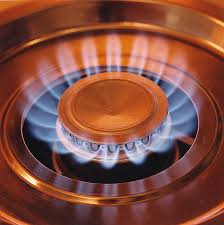Natural Gas is a naturally-occurring mixture of hydrocarbon and non-hydrocarbon gases found in porous formations beneath the earth's surface. It is not a pure element like oxygen, but a mixture of gases of which hydrocarbon gases are the components that are combustible and produce heat.
Natural gas distributed by utilities varies in composition. The heat-producing hydrocarbons are composed of the elements Carbon and Hydrogen. Methane (CH4) is always the largest component. Ethane, propane (C3H8) and butane are heavier, "hotter" hydrocarbons produced from natural gas wells, and are present in low concentration. Nitrogen, Oxygen, and Carbon Dioxide are the major components (99.9%) of air, but are considered contaminants of natural gas.
What is Natural Gas?
Read a detailed article from the American Gas Association, the premier organization for gas utilities and pipelines.What is Natural Gas?

Combustion of natural gas is the chemical reaction of oxygen with a combustible material which produces heat.
There are three requirements for combustion. If one of these three components is missing, combustion cannot occur.
- Fuel (natural gas, in this case).
- Oxygen.
- A source of ignition.
Natural gas will not burn unless the mixture is within a flammable range of roughly 4 to 15% gas per volume of air. Above and below these amounts it will not burn. The most efficient or ideal mixture is about 10% gas.
A combustible mixture of natural gas with air also has a very high ingnition temperature of about 1150°F, which is almost twice the ignition temperature for gasoline. Here are possible sources of ignition:
- Any open flame such as a pilot light, match, or lighted candle.
- Static electricity spark.
- Switching ON or OFF Any Light, Appliance, Television, Stereo or any other Device,
- Heating element or motor in an electric appliance.
- Internal combustion engine, while running or starting.
- Overhead electrical transformer.
- A ringing doorbell
Natural gas is lighter than air, so it can dissipate into the air rapidly, making accidental combustion difficult. It's also colorless, non-toxic, and had no taste in its natural state. When taken from the ground, natural gas is odorless. PNG adds a non-toxic chemical odorant called mercaptan to make leaks easy to smell. However, there may be times when the smell of the odorant is weak or not present, even though there is a leak.
Altogether, these factors add up to making accidental ignition or combustion of natural gas an unlikely event. Nonetheless, helping you learn how to use clean burning natural gas safely throughout your home is one of our top proprities. It is important for you and your family to understand natural gas and related safety information.

